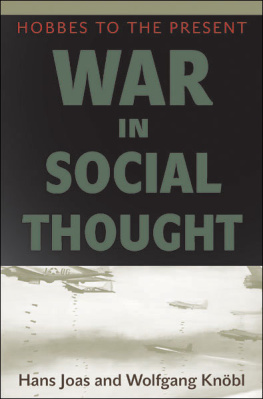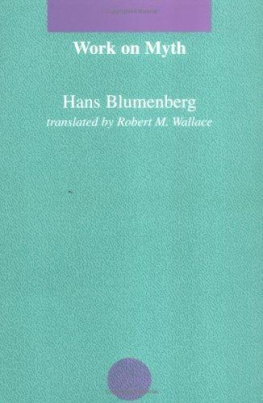War in Social Thought
HOBBES TO THE PRESENT
Hans Joas and Wolfgang Knbl
translated by Alex Skinner
PRINCETON UNIVERSITY PRESS
Princeton & Oxford
First published in Germany under the title Kriegsverdrngung:
Ein Problem in der Geschichte der Sozialtheorie Suhrkamp Verlag, Frankfurt am Main, 2008.
English translation 2013 by Princeton University Press
Published by Princeton University Press, 41 William Street, Princeton, New Jersey 08540
In the United Kingdom: Princeton University Press, 6 Oxford Street, Woodstock, Oxfordshire OX20 1TW
press.princeton.edu
Jacket Art: Gerhard Richter, Bombers, 1963, Oil on canvas 51-1/8 x 70-7/8 in. Courtesy of the artist.
All Rights Reserved
Library of Congress Cataloging-in-Publication Data
Joas, Hans, 1948
[Kriegsverdrngung. English]
War in social thought : Hobbes to the present / Hans Joas and Wolfgang Knbl ; translated by Alex Skinner.
p. cm.
First published in Germany under the title Kriegsverdrngung: Ein Problem in der Geschichte der Sozialtheorie, [published by] Suhrkamp Verlag,
Frankfurt am Main, 2008.
Includes bibliographical references and index.
ISBN-13: 978-0-691-15084-0 (cloth : alk. paper)
ISBN-10: 0-691-15084-2 (cloth : alk. paper) 1. War and
society. 2. SociologyHistory19th century. 3. SociologyHistory
20th century. I. Knbl, Wolfgang, 1963 II. Skinner, Alex. III. Title.
HM554.J6313 2013
303.6'6dc23 2012005612
British Library Cataloging-in-Publication Data is available
This work is published with support from the Max Weber Center for Advanced Cultural and Social Studies at the University of Erfurt, the Albion Small fund of the Sociology Department at the University of Chicago, and the University of Gttingen.
This book has been composed in Sabon
Printed on acid-free paper
Printed in the United States of America
10 9 8 7 6 5 4 3 2 1
CONTENTS
PREFACE
IN 2009 WE PUBLISHED a book called Social Theory, which attempts to provide a comprehensive overview of developments in sociological theory and adjacent fields in the German-, English-, and French-speaking worlds since the Second World War. Our latest joint effort is another book of theory and history of thought. This book goes much further back in history but has a narrower thematic focus. We are concerned here with the history of social theorizing on war and peace. The period in question extends from the early modern revolution in thinking about political issues in the work of Thomas Hobbes to the immediate present. There was of course an extensive philosophical, theological, and historiographical discourse on war and peace before Hobbes. By beginning with Hobbes, however, we are following a well-founded convention common within philosophy and the social sciences, one evident in the work of authors from Leo Strauss to Talcott Parsons. Our account revolves around the development of sociological theory, though supplemented by consideration of those thinkers whose writingswhatever their specific disciplinary affiliationhave exercised and continue to exercise a great influence on the development of sociology and the social sciences. We have not been concerned to achieve encyclopedic completeness, but we have tried to write a coherent narrative presenting a history of theory rather than the history of a discipline.
The key justification for our project is that, particularly when it comes to the topic of war and peace, we can fully comprehend and evaluate arguments only in their historical contexts. A historical account enables us to observe current assumptions and conclusions, as it were, in statu nascendi. We are not advocating a historical reductionism here, as if every contemporary idea were merely a lingering echo of classical thinking. But the practice of analyzing arguments in context helps us take a step back and gain perspective when thinking about the present.
We decided to organize the mass of relevant material on an essentially chronological basis. One alternative would have been to structure our account around paradigms, whether still emerging or with a lengthy tradition often extending over vast stretches of time (such as power-political realism). We decided against this because it would have forced us to indulge in numerous schematizations and repetitions; it is seldom possible to confine the most interesting thinkers within the clear-cut boundaries of paradigms.
Like our previous joint effort, this book too is based partly on academic courses; in this case, political motifs play a greater role. But we should mention that the origins of this book project also lie in a plan partially pursued but eventually abandoned. Years ago we made the decision to write a better and more comprehensive version of Gnther Wachtlers (1983) commendable but diminutive volume with its brief excerpts from important social scientific analyses of the armed forces. The introduction to this planned volume grew exponentially, far beyond our original intentions; we now present it, in expanded form, as a publication in its own right. Both authors have already published various texts on parts of this history. We have taken the liberty of drawing on our earlier work for some of the passages in this new book. This applies especially to passages from Hans Joass book War and Modernity (2003), though there the history of theory was just one motif among others and the focus was on the relationship between the experiences that constitute values and experiences of violence; it applies also to the introduction by Wolfgang Knbl and Gunnar Schmidt to their jointly edited volume Die Gegenwart des Krieges (2000, The Presence of War) and the essay by Wolfgang Knbl on the paradoxes of markets in violence: Krieg als Geschft (2006b, War as Business).
We have sought to highlight one leitmotiv of our history of the relationship between social thought and war by using a term not used before as far as we know, namely the suppression of war. This choice of term is rooted in the observation that throughout the period examined herefrom Hobbes to Habermas as it werewars are often constitutive of theory construction, as the informative background to ideas, yet they do not appear in theories themselves at all or only to a small extent. This at least raises the suspicion that there is a mechanism at work here of the kind described by Sigmund Freud. According to him, frightening and threatening experiences perceived as negative are the very ones the conscious mind is likely to shut outwithout robbing them of their potency. As our account shows, wars and periods of escalating tensions are often times of intensive interpretive production, featuring a highly positive mythologization of us in contrast to an equally negative mythologization of them. Once hostilities have abated, these interpretations are often discarded or denied with much shame. This may apply to the relevant thinkers and scholars themselves or to their successors and admirers. In any case, wars represent a special affective challenge to our thinking, to which people often react with strategies of avoidance or mythologization or with historical self-consolation, as when a particular war is interpreted as the last that will be waged before the rise of a peaceful world.
But it would be a misunderstanding of our choice of terminology to imagine that we wish to psychoanalyze theory production. We are neither qualified nor motivated to do so. We will not be tracing the consequences of the suppression of war in the work of those authors in which it is most strikingly evident. Our focus is on the thematization of war, whatever marginal or distorted forms this may take. In-depth exploration of how social theory has approached the topic of war over the centuries can and should contribute to overcoming the suppression of war and to making the contemporary social sciences more realistic in this regard.






